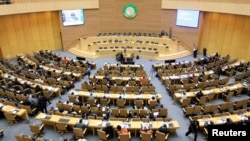A spokesman for the African Union (AU) says high ranking officials from the group will meet in the Ivory Coast’s commercial capital, Abidjan Tuesday to promote security and stability on the continent.
“The whole idea is to bridge the divide between the policy makers and the practitioners,” said AU spokesman El-Ghassim Wane. “It is also to facilitate coordination [and] harmonization among special envoys among officials working on the same issues on the African continent, and it provides the platform for outreach for AU’s efforts on peace and security on the continent.”
Also attending the meeting will be the leadership of regional economic communities, the United Nations, Arab League, European Union and member of bilateral partners, academic researchers and representatives of civil society.
“A number of stakeholders are involved in peace efforts on the African continent, and when efforts are not appropriately coordinated their impact is of course weakened,” said Wane. “Secondly, it is to ensure that AU’s efforts and those of our partners … are better known to the larger African public. It is also to trigger a debate among Africa civil society groups, researchers and other stakeholders on what the AU is doing right and wrong, so we can learn from our mistakes.”
Some analysts have accused the AU of not being proactive and of failing to resolve the many conflicts that keep plaguing the continent.
Wane acknowledged the continental body faces security challenges, but added that significant efforts and measures have been implemented to resolve conflict.
“We have made tremendous progress over the past decade…. We have moved forward recently in Mali, we have moved forward between Sudan and South Sudan and we have made progress in Somalia,” said Wane. “We need to enhance our efforts; we need to review at times some of our action[s] to make them far more effective than they have been.”
He also acknowledged the challenges the AU faces from armed insurgents and terrorists in some of its member states including Libya, Somalia and the Democratic Republic of Congo.
“As much as we have made tremendous progress, we are also mindful of the challenges ahead. Our objective of the meeting is to end all conflicts on this continent by the year 2020,” said Wane. “We are working hard towards it and hopefully, we will achieve our target.”
Abyei referendum controversy
Meanwhile the African Union has sharply condemned the “unilateral referendum” conducted by the Dinka Ngok group in the disputed, but oil-rich Abyei.
“Any unilateral action is dangerous, irresponsible and can of course reverse the progress we have made. And it is within that context that we strongly condemn, the so-called referendum organized by the leadership of the Dinka Ngok community in Abyei,” said Wane.
“The whole idea is to bridge the divide between the policy makers and the practitioners,” said AU spokesman El-Ghassim Wane. “It is also to facilitate coordination [and] harmonization among special envoys among officials working on the same issues on the African continent, and it provides the platform for outreach for AU’s efforts on peace and security on the continent.”
Also attending the meeting will be the leadership of regional economic communities, the United Nations, Arab League, European Union and member of bilateral partners, academic researchers and representatives of civil society.
“A number of stakeholders are involved in peace efforts on the African continent, and when efforts are not appropriately coordinated their impact is of course weakened,” said Wane. “Secondly, it is to ensure that AU’s efforts and those of our partners … are better known to the larger African public. It is also to trigger a debate among Africa civil society groups, researchers and other stakeholders on what the AU is doing right and wrong, so we can learn from our mistakes.”
Some analysts have accused the AU of not being proactive and of failing to resolve the many conflicts that keep plaguing the continent.
Wane acknowledged the continental body faces security challenges, but added that significant efforts and measures have been implemented to resolve conflict.
“We have made tremendous progress over the past decade…. We have moved forward recently in Mali, we have moved forward between Sudan and South Sudan and we have made progress in Somalia,” said Wane. “We need to enhance our efforts; we need to review at times some of our action[s] to make them far more effective than they have been.”
He also acknowledged the challenges the AU faces from armed insurgents and terrorists in some of its member states including Libya, Somalia and the Democratic Republic of Congo.
“As much as we have made tremendous progress, we are also mindful of the challenges ahead. Our objective of the meeting is to end all conflicts on this continent by the year 2020,” said Wane. “We are working hard towards it and hopefully, we will achieve our target.”
Abyei referendum controversy
Meanwhile the African Union has sharply condemned the “unilateral referendum” conducted by the Dinka Ngok group in the disputed, but oil-rich Abyei.
“Any unilateral action is dangerous, irresponsible and can of course reverse the progress we have made. And it is within that context that we strongly condemn, the so-called referendum organized by the leadership of the Dinka Ngok community in Abyei,” said Wane.





